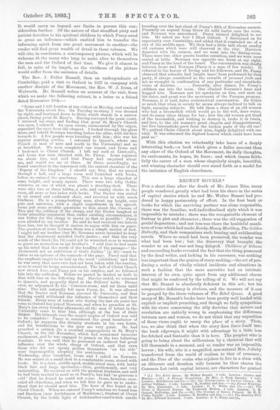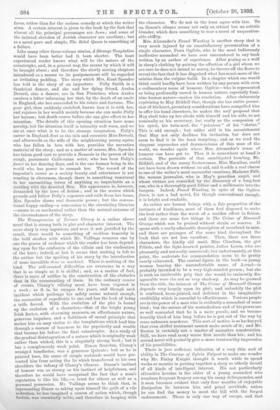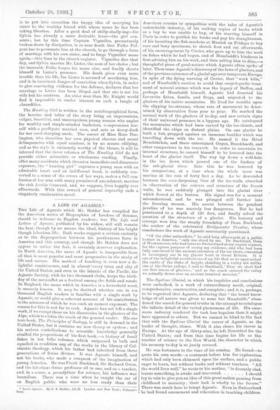RECENT NOVELS.* FOR a short time after the death of
Mr. James Rice, many people wondered greatly what had been his share in the series of capital stories which he and Mr. Walter Besant had pro- duced in happy partnership of effort. In the first book or books for which the surviving partner was alone responsible, there was the familiar, well-individualised style which it was impossible to mistake ; there was the recognisable element of fantasy in plot and character ; there was the old suggestion of genial dogmatism ; and not less was there the healthful manli- ness of tone which had made Beady-Money Mortiboy, The Golden. Butterfly, and their companions such bracing and exhilarating novels. Where so much had been preserved, the wonder was what had been loot; but the discovery that brought the wonder to an end was not long delayed. Children of Gibeon and succeeding books revealed the fact that the thing possessed by the dead writer, and lacking in his successor, was nothing less important than the genius of story-making,—the art of pro- ducing a series of vitally related incidents and situations in such a fashion that the mere narrative had an intrinsic interest of its own, quite apart from any additional charm that might be conferred by the telling of it. We will not say that Mr. Besant is absolutely deficient in this art; but his comparative deficiency is obvious, and the measure of it can be ganged by the three volumes of The Rebel Queen. A good many of Mr. Besant's books have been pretty well loaded with explicit or implicit preaching, and though we fully sympathise with his views concerning the silly doctrine that nature and revelation are entirely wrong in emphasising the difference between men and women, we do not think that any exposition of these views ought to usurp the place of a story. Then, too, we also think that when the story does force itself into the book edgeways, it might with advantage be a little less far-fetched and fantastic than it is here. The prophet who is going to bring about the millennium by a chemical that will kill thousands in a moment, and so render war an impossible horror ; his wife, who is a magnified, non-natural Mrs. Jellaby transferred from the world of realism to that of romance ; and the Peer of the realm who rejoices to live in a slum with an illiterate and drunken wife because he thus shares the Common Lot (with capital letters), are characters for genteel
* (1.) The Rebel Queen. By Walter Besant. 3 vols. London : Chatro and Windus.—(2 ) A Strange Temptation. By Mrs. j. Kent Spender. 3 vols. London Hutchinson and 0o.—(3.) The 7'ransgreeston of Terence Clancy. By Arthur Vallings. 3 vols. London It. Bentley and Son.— (4.) Pound Wanting, By Mrs. Alexander. 3 vols. London; F. V. White and Co.—(3.) The Crime of Nauman Grange. By Frederick Breton. 3 vols. London: J. R. Osgood, MAD/mine, and 00.—(3.) The Courage of Syttia Pasant. By H. B. Finlay Knight. 3 vole. London : it. Bentley and Son.—(7.) The Hunting Girt, By Mrs. Edward Kennard. 3 vole. Loudon: F, V. White and Co.
farce, rather than for the serious comedy at which the writer aims. A certain interest is given to the book by the fact that almost all the principal personages are Jews ; and some of the isolated sketches of Jewish character are excellent ; but as a novel pure and simple, The Rebel Queen is something of a failure.
Like many other three-volume stories, A Strange Temptation would have been better had it been shorter. The least experienced reader knows what will be the nature of the catastrophe, and, in a general way, the means by which it will be brought about ; and therefore the slowly moving chapters introduced as a means to its postponement will be regarded as irritating padding. The story which Mrs. Kent Spender has told is the story of an imposture. Polly Smith is a theatrical dancer, and she and her dying friend, Azalea Deveril, also a dancer, are in San Francisco, when Azalea receives a letter informing her that, by the death of an uncle in England, she has succeeded to his estate and fortune. The poor girl, thus suddenly enriched, knows how it is with her, and rejoices in her wealth mainly because she can make Polly her heiress; but death comes before she can give effect to her intention. The details of this opening situation have some novelty, but the situation itself is tolerably well worn, and we see at once what is to be the strange temptation. Polly's career in England, first as the rich and eccentric Miss Deveri], and afterwards as the wife of the neighbouring young squire who has fallen in love with her, provides the narrative material of the story ; and as a matter of course, Mrs. Spender has taken good care to provide a Nemesis in the person of the rough, passionate Californian actor, who has been Polly's fianc6 in her dancing days, and is the one human being in the world who has power to unmask her. The record of the impostor's career as a society beauty and entertainer is not wanting in cleverness, though there is something unnatural in her unremitting terror of anything so improbable as a meeting with the deserted Ben. His appearance is, however, demanded by the laws of fiction ; and in the scenes which precede and follow Polly's exposure and exile from her home, Mrs. Spender shows real dramatic power ; but the conven- tional happy ending—a concession to the circulating libraries —seems to us mechanical rather than the natural outcome of the circumstances of the story.
The Transgression of Terence Clancy is a rather clever novel that is strong both in plot and character interest. The mere story is very ingenious, and were it not justified by the result, there would be something of reckless temerity in the bold strokes with which Mr. Vallings removes one by one the pieces of evidence which the reader has been depend- ing upon for the confusion of the villain and the vindication of the hero ; indeed, at last it seems that nothing is left to the author but the spoiling of his story by the introduction of some incredible deus ex machind. There is nothing of the kind. The self-created difficulties are overcome in a way that is as simple as it is skilful ; and, as a matter of fact, there is more of artifice in the construction of the obstacles than in the surmounting of them. In the ordinary course of events, Clancy's villainy must have been exposed in a week ; as it is, he escapes for years, and though each incident which prolongs his safety seems natural enough, the succession of expedients to one end has the look of being a trifle forced. With the evolution of the plot is bound up the evolution of a character,—that of the bright young Irish doctor, with charming manners, an affectionate nature, generous impulses, and a flabbiness of moral principle that makes him an easy victim to the temptations which lead him through a morass of baseness to the popularity and wealth that become his before the final catastrophe. As a study of the gradual disintegration of a nature which is originally weak rather than wicked, this is a singularly strong book ; but it has a conspicuously weak point. Simon Secretan, Clancy's wronged benefactor, was a generous Quixote; but as he is painted here, his sense of simple rectitude would have pre- vented him from acting the lie which transferred to his own shoulders the infamy of Clancy's vileness. Simon's instinct of honour was as strong as his instinct of helpfulness, and therefore he would have recognised the fact that a man's reputation is like his life,—a trust for others as well as a personal possession. Mr. Vallings seems to think that, in representing Simon as taking upon himself the guilt of a vile seduction, he has imagined a course of action which, though foolish, was essentially noble, and therefore in keeping with the character. We do not in the least agree with him, To us, Simon's silence seems not only an ethical but an artistic blunder, which does something to mar a novel of unquestion- able ability.
Mrs. Alexander's Pound Wanting is another story that is very much injured by an unsatisfactory presentation of a single character, Piers Ogilvie, who is the most ludicrously ineffective scoundrel we have ever encountered in any book written by an author of experience. After posing as a wolf in sheep's clothing by gaining the affection of a girl whom we are sure he does not intend to marry, he throws off the fleece to reveal the fact that it has disguised what has much more of the asinine than the vulpine build. In a chapter which one would think could hardly have been written by any person with even a rudimentary sense of humour, Ogilvie—who is represented as being profoundly versed in human nature, especially fensi- nine human nature—makes his revelation. After elaborately explaining to May Riddell that, though she has entire posses- sion of his heart, pecuniary considerations have compelled him to offer his hand elsewhere, he makes the naif proposal that May shall take up her abode with himself and his wife, to act nominally as his secretary, but really as the companion of his spirit, his twin-soul, the " priestess " of his "shrine." This is odd enough ; but odder still is his astonishment that May not only declines his invitation, but does not seem to find it in the least tempting ; and as we read the eloquent reproaches and denunciations of this man of the world, we wonder again where Mrs. Alexander's sense of humour can have got to. That it is somewhere at hand is certain. The portraits of that unmitigated humbug, Mr. Riddell, and of the sunny Scotswoman, Miss Macallan, could not have been drawn without its aid, and it adds a real charm to one of the writer's most successful creations, Madame Falk, the woman journalist, who is May's guardian angel, and whose virtues are rewarded by the discovery of a long-lost son, who is a thoroughly good fellow and a millionaire into the bargain. Indeed, .Fewnd Wanting., in spite of the Ogilvie fiasco, is not a bad novel, for though conventional enough, it is bright and readable.
As critics are human beings with a fair proportion of the instincts of kindliness, most of them feel disposed to make the best rather than the worst of a maiden effort in fiction, and there are some few things in The Crime of Mamma/ Grange which can be praised without strain or reserve. It opens with a really admirable description of moorland in mist, and there are passages of the same kind throughout the book that are not less excellent. Then, there are three characters, the kindly old maid, Miss Charlton, the girl Fed% and the light-hearted painter, Julius Leven, who are pleasantly and naturally conceived ; but unfortunately, at this point, the materials for commendation seem to be pretty nearly exhausted. The central figure in the book—a young woman bearing the uncomfortable name of Azrael—is probably intended to be a very high-minded person ; but she is such an intolerable prig that she would be eminently dis- agreeable were she not so very shadowy. As may be guessed from the title, the interest of The Crime of Mammal grange depends very largely upon its plot; and unluckily the plot is confused, loose-jointed, and deficient in the imaginative credibility which is essential to effectiveness. Various people are in the power of a man who is evidently a scoundrel of some kind ; but the nature of his scoundrelism and of his power are so well concealed that he is a mere puzzle, and we become heartily tired of him long before he is put out of the way by some unknown murderer. This sort of motive is so hackneyed that even, skilful treatment cannot make much of it ; and Mr. Breton is certainly not a master of narrative construction. Still, we have read mesty worse first novels than his ; and his second novel will probably give a more trustworthy impression of his possibilities.
There is just sufficienL indication of a very thin sort of ability in The Courage of Sylvia Fulgent to make one wonder why Mr. Finlay Knight thought it worth while to spend weeks or months in putting together a story so utterly devoid of all kinds of intelligent interest. His not particularly attractive 'heroine is the sister of a young scoundrel who numbers frequent forgery among his many delinquencies, and it soon becomes evident that only four months of enjoyable dissipation lie between him and penal servitude, unless he can find the money to meet the bill with the forged endorsement. There is only one way of escape, and, that is to put into execution the happy idea of marrying his American cousins to sympathise with the tales of Agassiz's sister to the wealthy friend with whose name he has been taking liberties. After a good deal of shilly-shally-ing—for Sylvia has already a more desirable lover—the girl con- sents; but by this time Captain Vignolles, prematurely broken-down by dissipation, is so near death that Fulke Ful- gent has to personate him at the church, to go through a form of marriage with his own sister, and to forge Vignolles' name again,—this time in the church register. Vignolles dies that day, and Sylvia marries Mr. Lister, the man of her choice ; but the incurable Fulke forges his name also, and finally shoots himself in Lister's presence. His death gives even more trouble than his life, for Lister is accused of murdering him, and is in imminent danger of conviction when Sylvia, in order to give convincing evidence for the defence, declares that her marriage to Lister has been illegal, and that she is not his wife but his mistress. An abler man than Mr. Knight would find it impossible to confer interest on such a tangle of absurdities.
The Hunting Girl is written in the autobiographical form, the heroine and teller of the story being an impecunious, vulgar, beautiful, and unscrupulous young woman who angles for wealthy and simple-minded bachelors, compromises her- self with a profligate married man, and acts as decoy-duck for her card- sharping uncle. The career of Miss Rose Dar- lington, who describes her own physical charms and moral delinquencies with equal candour, is by no means edifying, and as the style is eminently worthy of the theme, it will be inferred that the three volumes of The Hunting Girt do not provide either attractive or wholesome reading. Finally, after many accidents which threaten immediate and disastrous exposure, the "hunting girl" captures a young man with an admirable heart and an indifferent head, is suddenly con- verted to a sense of the errors of her ways, makes a full con- fession of her sins with many promises of amendment, marries the rich Archie Ormerod, and, we suppose, lives happily ever afterwards. With this reward of general depravity ends a singularly unattractive novel.








































 Previous page
Previous page